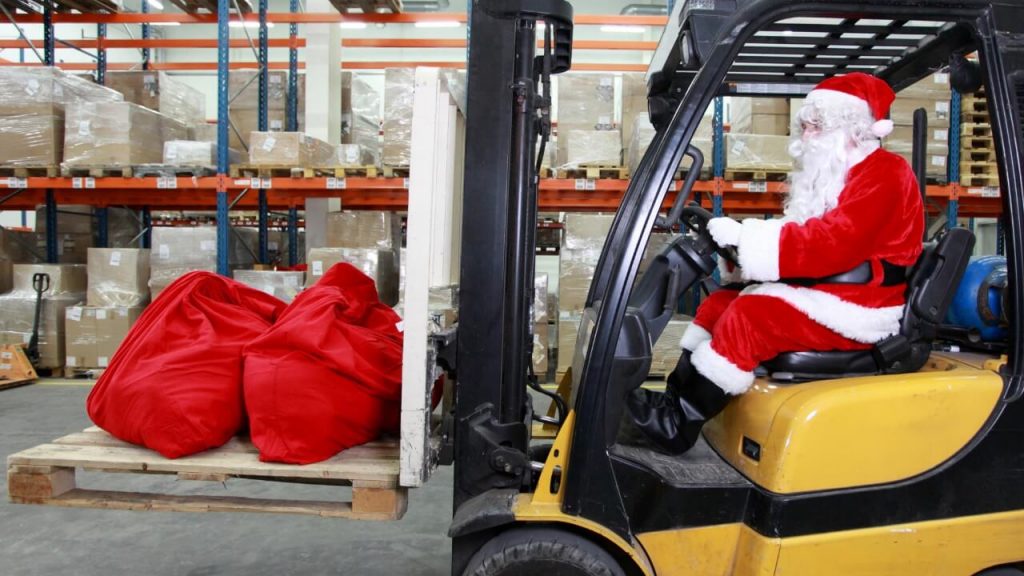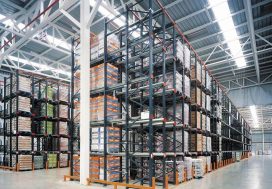
- Not enough and a lot of warehouse stocks: both variants are unsuitable
- Advice by WareTeka: Optimize your warehouse stock
- Lack of warehouses during the peak season
- Advice by WareTeka: Use flexible solutions
- A labor shortage in logistics is a thorny issue
- Advice by WareTeka: Try to outsource some of your logistics processes
- Conclusions: Focus on one season, plan ahead
The holiday season is a great opportunity to make a significant profit for retailers, as many consumers purchase goods during this period. But not all companies can cope with increased consumer demand. Only retailers who prepare for the holiday season in advance and have perfectly organized logistics can go through the peak season with minimal losses and maximum profits.
In this article, we explain what challenges trade companies can face and how different retailers solve their logistics issues before the holiday season.
Not enough and a lot of warehouse stocks: both variants are unsuitable
Supply chain disruptions in 2021 attracted the attention of both retailers and consumers. On the one hand, shelves at large retail stores are empty while the goods “get stuck” in ports and wait for unloading. On the other hand, retailers have a stock of goods in their warehouses which they haven’t sold yet and which takes up the place. Because of this, there is no space to place new freight in a warehouse.
Supply chain problems are indeed challenging. It is rather difficult to say that some measures would be appropriate and others would be ineffective in such a situation. Some retailers purchase safety stocks responsibly. For example, American company Lowe’s provides itself with them in advance to deliver them earlier to warehouses and avoid delays. Other companies, such as Amazon, announced discounts even before the holiday sales to clear out aging stocks.

Companies should plan and purchase goods responsibly. Each retailer has to decide when and how many goods it should buy according to its business peculiarities. It is necessary to check the supply chain in advance to replenish stocks and ensure smooth operation during the high season. It is also worth considering how to sell aging stocks or goods with expiring shelf life.
Advice by WareTeka: Optimize your warehouse stock
Retailers that need to free up warehouse space or turn over aging stocks can take several measures:
Increase sales earlier in the season. Most consumers make purchases for the New Year holidays in November. Peak order volume can be expected as early as the end of November or the beginning of December. It will last until the holidays. Plus, driving sales earlier has such advantages as:
- Freeing up more warehouse space;
- Decreasing storage costs;
- Increasing business profitability.
Moreover, consumers rarely use self-delivery during the holiday period. Therefore, delivery services have a lot of work. But if sales are increased in advance, the workload on couriers will be reduced thanks to self-delivery.
Pay attention to demand forecasting. If demand is evenly distributed during the season, it is easier to plan the work of warehouse staff. The staff works more efficiently, without stress and overtime work. Demand forecasting helps to schedule labor efficiently and to ensure that all warehousing processes get the attention they deserve.
Consider discounts for customers. For example, “buy one item and get another one for free” to clear out obsolete stocks. Paying for storage of aging stocks can quickly eat the margin. Make room for popular seasonal goods, by offering less popular products as an add-on to them to increase the value of the purchase for buyers while reducing the storage costs.
Lack of warehouses during the peak season
Vacancy rates of storage facilities are at an all-time low. This trend is observed both abroad (in the United States it is 4.3 percent) and in Ukraine. According to WareTeka specialists, even in Kyiv, this indicator does not exceed 3%. In such a situation, even a major market player like Amazon was forced to impose restrictions on the stock of FBA sellers to make room for holiday sales.
In unstable supply chains, retailers have to create more stock. Therefore, a lack of warehouses becomes severe.

To get a high-quality storage facility, retailers should use a different approach. Supply chain disruptions contribute to new logistics solutions’ emergence in the market.
Advice by WareTeka: Use flexible solutions
The Ware2Go warehousing model provides small and medium-sized companies with the ability to store goods in top-tier storage facilities. They pay only for the needed space and services, if necessary. Another advantage is that there are no seasonal overpayments and no long-term contracts. Ware2Go also offers retailers strategic solutions, like storing aging or slow-moving stocks in less expensive regions.
In Ukraine, companies can also use such warehouses. WareTeka offers temporary storage warehouses. This is the best solution in a high season. Retailers can create safety stocks before the holiday shopping season begins. So they will not lose profits because of supply chain disruptions or lack of warehouses.
As a result, the use of temporary storage warehouses allows companies to solve several tasks at once:
- Getting a place to store their products under optimum conditions;
- No overpayments for idle space;
- Flexible supply chain development. Using this approach, a retailer can extend the lease or refuse storage space after the peak season.
A labor shortage in logistics is a thorny issue
During the holiday season, both retailers and logistics providers need additional workers. This is necessary to cope with the heavy workload. Both sides offer higher salaries and bonuses to new employees in the struggle for qualified staff.

For example, Amazon decided to hire 150,000 temporary warehouse workers before the holiday season in 2021. To attract new employees, the company offers an initial payment of $18 per hour, with a minimum of $15. Target offered its employees a $2-an-hour bonus during a high season and allowed flexible management of their schedule.
However, only a large company can offer cash rewards and other bonuses to new workers. The training of seasonal staff may also require additional resources, while small and medium-sized businesses have limited ones. So it makes sense for other retailers to outsource some logistics tasks. So they only pay for the result.
Advice by WareTeka: Try to outsource some of your logistics processes
Not all companies can solve the labor shortage issue. In this case, the best solution is to outsource logistics.
WareTeka offers a wide range of logistics outsourcing services. For example, if a company needs to organize all its processes from the moment of receiving a request for an order to the delivery to a consumer, it should pay attention to the fulfillment service. It is a complex approach that allows a large number of orders processing, as contractors have a developed infrastructure, a specialized WMS system, qualified staff, working experience with different retailers. They also work on weekends. Traditionally, fulfillment is considered to be a service only for online stores. However, it is not that true. Fulfillment is suitable for different retailers who require to store and unload the goods, deliver to end consumers, and other common logistics services.
If a company needs to solve one specific problem, for example, packing and promotional kits composition, it can order a co-packing service. There is no need to purchase consumables and special equipment, order branded packaging, attract additional labor — the retailer pays only for the result. So you can focus on higher priority tasks, increase the average check of an order, and fulfill all orders on time without any trouble.
Which service to choose — depends on your business needs. If you have not decided on the necessary service, you can leave a request on WareTeka. Our specialists will select suitable for your business offer.
Conclusions: Focus on one season, plan ahead
Going through the upcoming holiday season is a priority challenge for most retailers. However, it is worth considering that trends related to low vacancy rates of storage facilities or labor shortages during the high season will continue. That is why it is necessary to plan activities ahead of this peak season in a way that they comply with the long-term strategic plan.
Retailers that pay attention to the resilience and flexibility of their logistics will make a stable profit, regardless of the state of the supply chain and consumer sentiment. It is necessary to forecast demand, create safety stocks, look for warehouse space, and attract additional resources for your logistics. Besides, it is worth using flexible solutions and outsourcing possibilities. Then the peak season will be easier to cope with.




